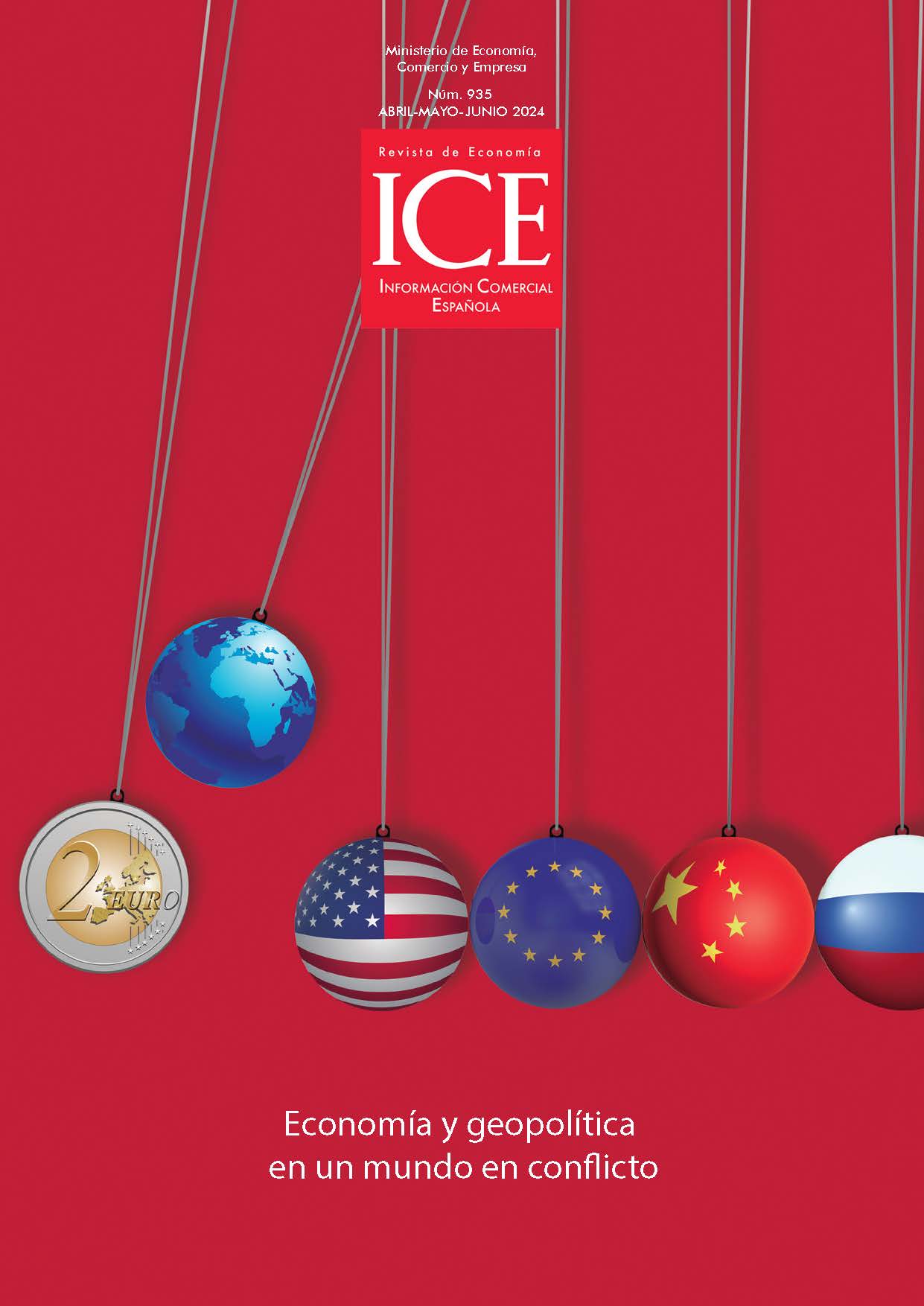China and Russia. Nationalism, economics and geopolitics
##plugins.themes.bootstrap3.article.sidebar##
Downloads
##plugins.themes.bootstrap3.article.main##
China and Russia, although with significant differences, are two revisionist post-empires with a common ambition: to change the global order. Russia's intentions have been more clearly demonstrated with the invasion of Ukraine, while China has benefited from Russia's aggressiveness to offer an alternative to the Global South. Russia, a post-empire in decline, increasingly needs China's support to continue with its war against Ukraine. China’s willingness to provide such support comes in exchange for Russia’s push to change the global order but also for better access to Russian raw materials, weapon capabilities as well as the Arctic Route. As the Russian economy becomes more dependent on China, the balance should continue to tilt in favor of the latter.
##plugins.themes.bootstrap3.article.details##
- Alicia García-Herrero, Daniel Navia, Mario Nigrinis Ospina, Las economías emergentes que liderarán el crecimiento. EAGLEs , ICE, Revista de Economía: No. 859 (2011): LA NUEVA GEOGRAFÍA DE LA INTERNACIONALIZACIÓN
- Alicia García-Herrero, China's economic outlook post-COVID-19 and beyond , ICE, Revista de Economía: No. 923 (2021): El impacto económico de la pandemia
- Alicia García-Herrero, China’s concept of strategic autonomy is about dual circulation , ICE, Revista de Economía: No. 930 (2023): Autonomía estratégica
Acharya, A. (2020). The Myth of the ´Civilization State´: Rising Powers and the Cultural Challenge to World Order. Ethics & International Affairs, 34(2), 139-156.
Ambrosio, T. (2017). The Architecture of Alignment: The Russia–China Relationship and International Agreements. Europe-Asia Studies, 69(1), 110-156.
Coker, C. (2019). The Rise of the Civilizational State. Polity Press.
Dostoievski, F. M. (1881). Dnevnik pisatelya (Diario de un escritor). http://az.lib.ru/d/dostoewskij_f_m/text_0530.shtml
Fong, C., & Maizland, L. (2022). China and Russia: Exploring Ties between Two Authoritarian Powers. Council on Foreign Relations. https://www.cfr.org/backgrounder/china-russia-relationship-xi-putin-taiwan-ukraine?gclid=CjwKCAiAlJKuBhAdEiwAnZb7ldC9AhbXqAg7PtYy0xySfE3E5OqUuJGwU5VGMz8xjuhX_nfKIZei7hoCNuUQAvD_BwE
Gabuev, A. (2024). Putin and Xi’s Unholy Alliance. Why the West Won’t Be Able to Drive a Wedge Between Russia and China. Foreign Affairs. https://www.foreignaffairs.com/china/putin-and-xis-unholy-alliance
García-Herrero, A., & Xu, J. (2016). The China-Russia trade relationship and its impact on Europe (Bruegel Working Paper No. 4/2016). https://www.bruegel.org/working-paper/china-russia-trade-relationship-and-its-impact-europe
Garcia-Herrero, A., & Xu, J. (2019). How does China fare on the Russian market? Implications for the European Union. Russian Journal of Economics.
Hillman, J. E. (2020). China and Russia: Economic Unequals. Center for Strategic & International Studies (CSIS). https://www.csis.org/analysis/china-and-russia-economic-unequals
Kissinger, H. (1994). Diplomacia. Ediciones B.
Korolev, A., & Portyakov, V. (2018). China-Russia Relations in Times of Crises: A Neoclassical Realist Explanation. Asian Perspective, 42(3), 411-437.
Lamo de Espinosa, E. (2021). Entre águilas y dragones. El declive de Occidente. Espasa.
Lo, B. (2008). Axis of convenience: Moscow, Beijing, and the new geopolitics. Brookings
Institution Press.
Lovell, S. E., Ripsman, N. M., & Taliaferro, J. W. (2009). Introduction: Neoclassical Realism, The State, and Foreign Policy. In S. E. Lobell, N. M. Ripsman & J. W. Taliaferro (Eds.), Neoclassical Realism, the State, and Foreign Policy (pp. 1-41). Cambridge University Press.
Mankoff, J. (2011). Russian Foreign Policy. The Return of Great Power Politics. Rowman & Littlefield Publishers (second edition).
Mankoff, J. (2022). Empires of Eurasia: How Imperial Legacies Shape International Security. Yale University Press and Center for Strategic and International Studies (CSIS).
Milosevich, M. (2024). El imperio zombi. Rusia y el orden mundial. Galaxia Gutenberg.
Ministerio de Asuntos Exteriores de la República Popular China. (2023, 22 de marzo). Declaración Conjunta firmada por el presidente Xi Jinping de la República Popular China y el presidente Vladímir Putin de la Federación de Rusia sobre la Profundización de la Asociación de Coordinación Estratégica Integral en la Nueva Era [Declaración conjunta]. Kremlin-Moscú. https://www.fmprc.gov.cn/esp/gjhdq/xo/3220/3222/202303/t20230322_11046126.html
Niblett, R. (2024). The New Cold War: How the Contest between the US and China Will Shape Our Country. Atlantic Books.
Ripsman, N. M., Taliaferro, J. W., & Lobell, S. E. (2016). Neoclassical Realist Theory of International Politics. Oxford University Press.
Rose, G. (1998). Neoclassical Realism and Theories of Foreign Policy. World Politics, 51(1), 144-172.
Sarotte, M. E. (2021). Not One Inch. America, Russia and the Making of Post-Cold War Stalemate. Yale University Press.
Sher, N. (2024, May 6). Behind the Scenes: China’s Increasing Role in Russia’s Defense Industry. Carnegie Endowment for International Peace.
Tsui, K. (2023). Russia and China are getting closer than ever. Semafor. https://www.semafor.com/article/12/06/2023/russian-approval-of-beijing-has-soared-a-new-poll-finds
Waltz, K. N. (1979). Theory of International Politics. McGraw-Hill.
Waltz, K. N. (2000). Structural Realism after the Cold War. International Security, 25(1), 5-41.
Xi, J. (2023). Avanzar con ánimos elevados por abrir un nuevo capítulo de la amistad, la cooperación y el desarrollo común entre China y Rusia. Ministerio de Relaciones Exteriores de la República Popular China. https://www.fmprc.gov.cn/esp/zxxx/202303/t20230320_11044940.html
Yoder, B. K. (2020). Theoretical rigor and the study of contemporary cases: explaining post-cold war China–Russia relation. International Politics, 57, 741-759.https://link.springer.com/article/10.1057/s41311-019-00173-z


